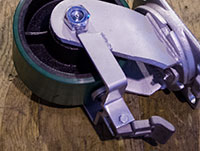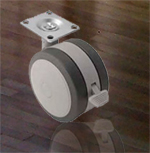Did you know you’re not stuck with the cheap plastic casters that come with every office chair ever made? There are many options for replacing the casters, and below we’re going to give a quick rundown on what information you’ll need to make an informed decision.
The first thing you will need to know is the stem size of your current casters. To find this out, you will have to remove the stem from the chair. From there, check out of our How to Measure Caster Stems page for more information. This is a very important step as casters may have several styles of stem as well as use either imperial or metric standards.
After that, determine the primary location of use. Will it be on a low pile carpet? Plastic or glass chair mat? Hardwood or tile floor? This information is critical for determining the right wheel material. On carpet, nylon or metal wheels are acceptable. On hard surfaces, especially damageable surfaces like hardwood, you want to get a soft wheel like neoprene, thermoplastic elastomer (synthetic rubber), or urethane. Soft rubber is also an option, but it may leave unsightly black marks on flooring where other soft treads will not.
From this point on, the choices are primarily aesthetic. Hooded or unhooded? If hooded, perhaps a color other than black, such as the windsor antique or bright brass? These choices won’t affect the functionality, but may be far more pleasing to the eye than the original casters.
Take a look at our online selection of casters or give us a call at 1-800-215-8220 to speak with a salesperson about all available options.


